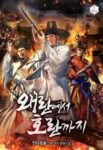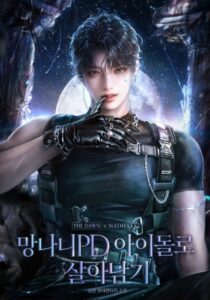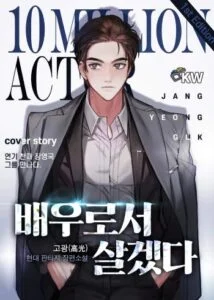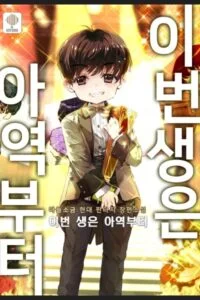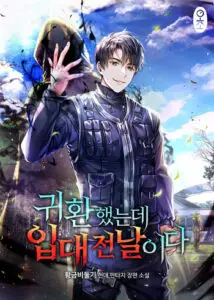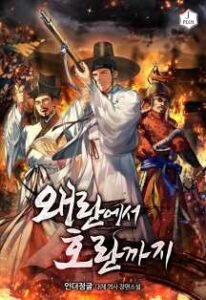The answer is the Sea
Phew, I finally finished.
Even though one was soon to die, I had a showdown with a powerholder most favored by our ancestors.
From this, a basic blueprint for “safety”—the first reason I came to Hanyang—had emerged.
Since that day, I realized that in this era, safety was far more important than progress.
If the powerholders in Hanyang were supplied with fertilizer, they would have no choice but to expand the Gyeongsang Left Naval District to protect the pipeline.
If the Japanese pirates saw our Panokseon ships roaming the front seas, they would lose the will to attack rashly.
Since the pirates who had invaded this time were annihilated, they probably wouldn’t dare to invade again for a year or two
Now, it was time to spread new knowledge in Hanyang.
“How is the goblin needle coming along, Uncle?”
“I’ve got the essential material from Ulsan, so it’ll be ready in a week.”
Good.
So far, the flying shuttle had been supplied only in Ulsan and Gangwon provinces.
It was time to distribute the flying shuttle nationwide.
The core technology of the flying shuttle was actually moving it using a pulley.
It wasn’t that the application of technology was difficult; it was just hard to come up with such an idea.
Of course, it was going to be tough to dramatically increase the production of cotton cloth.
But, before proceeding further, I needed to ask my business partner once again.
“Jongil-ajeossi, are you okay with this?”
“It would be a lie if I said I wasn’t disappointed, but the foundation is already laid. But will things really go as the young master predicted?”
“As clothing and food increase, commerce will inevitably develop.”
“Watching Ulsan, it seems the young master’s predictions might just come true…”
Commerce developing would mean Uncle Jongil could more easily support his family in Gangwon Province.
“And if there’s economic leeway, currency would be issued.”
“Currency…”
Indeed, solving the issue of Joseon’s poor economy was the biggest obstacle when writing this novel.
How long could the people of Joseon continue to use rice and cotton cloth as currency?
The introduction of something smaller than cotton cloth and lighter than rice as currency was essential.
With the advent of a currency, we could look forward to formal trade.
“Then, from a merchant’s perspective, there would be nothing more to wish for.”
In reality, if currency were issued, we would be in deep trouble.
Currently, we could engage in various businesses by utilizing cotton cloth, which could be considered a key currency.
But once currency was issued, cotton cloth would become just one of many commodities, losing its status as a key currency.
“That’s why what comes next is even more important.”
“…So the era where the sea becomes the answer, as you’ve always said, is coming?”
One of the main themes of the novel I intended to write was about the protagonist expanding his power through trade.
With the Age of Exploration beginning in the West and its dazzling advancements, gaining even a piece of that golden age would give us strength to overcome future hardships.
“Yes, the way for this Joseon to survive is the sea. Dominate the sea.”
Historically, the nation that controlled the seas ruled the world.
That was right.
I was going to the sea.
Before I started writing, I was a snotty-nosed kid who dreamt big after encountering the game about the Age of Exploration, completely enamored by the romanticism and grandeur of that era.
Looking back, it was an era of rampant looting, murder, and arson by white people, but in my childhood, it all seemed so romantic.
However, my reason for heading to the sea wasn’t to chase romance and dreams.
It was solely for survival!
The sea was the only answer for survival.
But heading to the sea during the Joseon era was no easy task.
There were several hurdles I must overcome to make it to the sea.
The biggest hurdle was Joseon’s maritime prohibition policies.
Joseon followed Ming China in implementing maritime prohibition policies.
If we delved deeper, there would be reasons for Joseon to implement such policies, but for now, the naval forces of Gyeongsang, Jeolla, and Chungcheong—the three provinces—were the foundation supporting these policies.
That’s why I built the Fair Wind.
Choosing fishing as my first endeavor upon regaining my senses was not only to solve Joseon’s food problem but also because trading at sea was the only way to prepare for the Imjin War.
This was also a device to persuade the readers, along with the synergy through the development of agriculture via fertilizer.
In truth, the fertilizer was a MacGuffin, and the core of the novel was about a protagonist from the Joseon era struggling to survive by trading at sea and preparing for the Imjin War with the wealth acquired through trade.
Thanks to the fertilizer that served as a MacGuffin, the royal court’s attention was drawn enough that now even the navy was engaging in fishing.
It’s as if the device I created to trick the readers hooked the king, and the nation moved accordingly.
Thanks to that, the biggest hurdle to going to sea—the navy—had been cleared.
Now, if we set our minds to it, we had all the conditions to trade as much as we wanted.
Maritime prohibition policies banning trade?
Are you kidding?
Then we would just engage in smuggling.
Wasn’t that why I gathered the nobles of Gyeongsang to agree on sending fertilizer to Hanyang?
After all, whether I die from the king’s purge or get trampled by the Japanese, death was the same.
But to go to the sea, there were a few more hurdles to clear.
“Sigh, it’s going to get even busier from here on out.”
“Hehe, to think it could get busier. I might need to learn cloning!”
“Cloning?”
“Ah, I have this friend who’s a bit unique. He’s quite the storyteller, knows a lot like you, young master. He told me an interesting story about Ancient China, where there was a technique to make one’s body appear in multiple places. He’s planning to introduce a protagonist who uses cloning in his work.”
Sounded like a protagonist straight out of a Hong Gildong story.
“There’s an order to everything. We can’t head to the sea just yet.”
The task of diverting the government’s attention had been initiated.
But what about the navigation skills?
A ship that wouldn’t capsize even in rough waves?
There were also many other large and small issues.
“Sigh!”
I wanted to go to the sea, but there were too many problems to solve.
“Young one, sighing will only bring misfortune!”
If only my youngest uncle had the strength and power, maybe I could have been able make a significant impact at sea too?
The Second Objective
The second objective for coming to Hanyang was “technology.”
The advancement of technology has made life more comfortable for humanity.
What did cotton farming, direct seeding, and fishing have in common?
They all have a labor-intensive industrial structure.
To ensure the rice planted in the fields would grow well, one must weed, and to catch fish, one must take a boat out to sea.
Cotton farming was no different.
To farm cotton, one must pick the cotton fluff one by one.
As a result, Ulsan found itself in a situation with a significant labor shortage.
So, a solution was devised to replace this labor force.
In fact, before even writing this novel, there were already some ideas I had brainstormed.
Among them, there were items that could be sufficiently realized with the technology of this era.
First off, a farming cushion that could reduce the effort needed for weeding even by a little garnered quite a positive response.
Just being able to sit comfortably while weeding was enough to considerably reduce the labor required.
But farming required tremendous amounts of labor not just for weeding but for harvesting and threshing as well.
Especially in this era, threshing with flails was a significantly strenuous task.
Moreover, due to fertilizer, the harvest increased, which meant there was even more to thresh.
To solve this, I thought about making a pedal-powered thresher.
The pedal-powered thresher was an innovative invention that could thresh rice by pedaling to rotate a cylinder.
However, to make the pedal-powered thresher, a crank was needed to convert linear motion into rotational motion.
Regrettably, knowing only of the pedal-powered thresher’s existence but not the principle of the crank, I asked our craftsmen to make it for me.
But even our craftsmen couldn’t produce a crank in this era.
However, this was Hanyang!
The capital of Joseon, a huge city where over 100,000 people lived.
Maybe something similar to the pedal-powered thresher could be made here?
So, I asked my second uncle about the craftsmen.
“Hmm, I believe the blacksmiths gather in the west of Banchon.”
“Thank you.”
I immediately headed to Banchon, a village near Sungkyunkwan, with my youngest uncle.[1]
“What are you trying to make this time by visiting the blacksmiths?”
“It may not be as significant as fertilizer, but it will still reduce labor.”
Huh, I’m really curious about what’s inside that head of yours.
Bang!
Bang!
Bang!
As expected of a blacksmith alley, the sound of metal echoed from here and there.
Most of these would be blacksmiths making agricultural tools, but there must be some with special skills among them!
Looking around, I saw an ajeossi cooling off with a hammer in hand.
“Excuse me.”
“Hmm? What do you need?”
He looked rugged and brusque, just like a typical blacksmith out of a novel.
“Is there a craftsman in this village who makes items usable by nobles?”
“Those of us in this neighborhood who make agricultural tools have made items ordered by noble houses once or twice.”
“Then, who is the most skilled among you?”
“Of course, that would be me!”
The blacksmith confidently pointed to himself.
“…What is your name?”
“My name? I’m Park Geosoon.”
Ah, really, oh my, his name matches the blacksmith whose hands keep slipping.
“Could you make something that rotates a tube by stepping on it?”
“…What do you need that for?”
What did you mean?
If a pedal-powered thresher was made, it would be nothing short of a revolution in threshing!
“Well, if it moves like a waterwheel, it shouldn’t be too difficult…”
That wouldn’t do.
“It needs to turn at least three or four times with a single step.”
To achieve that, bearings would be necessary, but wasn’t that just a matter of feeding engineers into it?
In novels, wasn’t there nothing that couldn’t be done by feeding engineers into the problem?
“How can a single step make the drum turn three or four times?”
If I knew that, I would be an engineer, not a writer.
That’s something you needed to figure out!
Why ask me?
Ah, I didn’t know anything about such modern, luxurious, yet provocative thing that?
“…Is there really no talent in Hanyang?”
Should I just resort to a windmill instead?
Windmills were relatively easy to make.
After all, you could make a windmill with just a steel chopstick.
Inserting a metal chopstick into a tree and pulling rice plants towards it might be primitive, but it’s an agricultural tool more advanced than a flail.
“Eek! Do not underestimate the night guards of Hanyang!”
You dare to defy a noble when you’re just a commoner?
Still, I didn’t want to pressure him by flaunting my status.
“I’m staying in Hanyang until next spring. If you finish it, send someone to the Office of the Inspector-General, Kim Daegan. I’ll give you five bolts of cotton cloth if you can make it.”
“Five bales of cotton cloth?!”
Two bales could buy a bag of rice, so five would sustain someone for half a year.
This offer should at least pique his interest.
“Ah, and on the way, I’m looking for a metal rod that’s long and sturdy like a chopstick…”
If it was difficult to make a pedal-powered thresher in Hanyang, I should at least show them how to make a rod thresher.
“I have some leftover iron… Would this suffice?”
Park Geosoon went into the workshop and came out with the metal rod I was looking for.
“Why do you have this?”
What was this?
A failed attempt turned into someone’s tears due to a slip of the hand?
“I made it separately so that I could have some convenience in my work, but if you need it, you can have it. Just give me five bundles of cotton cloth.”
This should make building a hulling paddle not too difficult.
I took out the cotton cloth from my pack.
Squeeeeeeeeeak!
The blacksmith measured five bundles of cotton cloth with a ruler and tore off the fabric as if he was used to this exchange.
What sort of primitive bartering scene was this?
Currency really needed to be developed sooner rather than later.
“Uncle, shall we go? We’re done here.”
“Alright.”
As we were about to leave the village, the blacksmith called out to me.
“By the way, if I really make a drum that moves by stepping on it, will you give me five bales of cotton cloth?”
Oh, he hadn’t given up yet.
I could see the artisan spirit in the blacksmith’s eyes.
I roughly sketched the shape of a crank on the ground.
“If you make something like this, you can roll the drum by pushing it with your feet.”
…Honestly, I didn’t even know. Even if I promised a single bale, I should discuss it with the village head.
“Ahem, I’ll try my best. Winter’s coming anyway, so there’s not much else to do.”
I had heard that blacksmiths and farmers had similar routines.
As farming season approached, blacksmiths got busy too.
“…If you can make it before I leave Hanyang, I’ll give you ten bales.”
Was ten bales too much for a pedal-powered thresher in this era?
As far as I knew, pedal-powered thresher were introduced in the early 1900s from Japan.
Wouldn’t that be a technological leap of at least 400 years?
This blacksmith must be brought to Ulsan immediately, even if it meant burying him in cotton cloth.
If he was capable of such craftsmanship, he might even make a flintlock or, better yet, the ultimate breechloader.
With such a rifle, I was confident we could sweep the souls of the Japanese through guerrilla warfare.
Regular matchlocks had shorter ranges than expected.
And although I was not sure about bows, I was confident in shooting!
On the way home, my youngest uncle asked,
“What are you planning to do with a drum that turns by stepping on it?”
“Using the rotational force of the drum to thresh the grain would make it much easier, wouldn’t it?”
“Hmm, it’s hard to understand just by hearing about it.”
That was to be expected.
If I hadn’t seen a video of a pedal-powered thresher efficiently threshing beans, I wouldn’t have thought to include it in my novel.
The thresher in the video I saw was spinning at an incredible speed, threshing the grain in an instant.
If a hulling paddle allowed one farmer to thresh a cartload of grain a day, a pedal-powered thresher could enable three farmers to thresh forty cartloads in a day.
It’s true that a hulling paddle was more efficient than a flail, but it still couldn’t compare to a pedal-powered thresher, which I earnestly hoped would be developed.
Such agricultural machinery, along with fertilizer, could trigger an agricultural revolution.
But since that was not the reality, there was nothing I can do.
“…It would be easier if you saw it with your own eyes.”
Wasn’t that why I came all the way to Hanyang?
I had three things to show to Yi I.
First, the flying shuttle, also known as a goblin needle.
Second, the thresher or holtae.
And lastly, the matchlock that took my grandfather’s life.
Picnic had a tough time carrying this load.
Now, all that was left was to meet the soon-to-be-deceased ajeossi and discuss how to distribute the flying shuttle and holtae.
Once that was done, I would have achieved half the reason for my visit to Hanyang.
[1] Sungkyunkwan was the elite national academy of Korea at that time.

